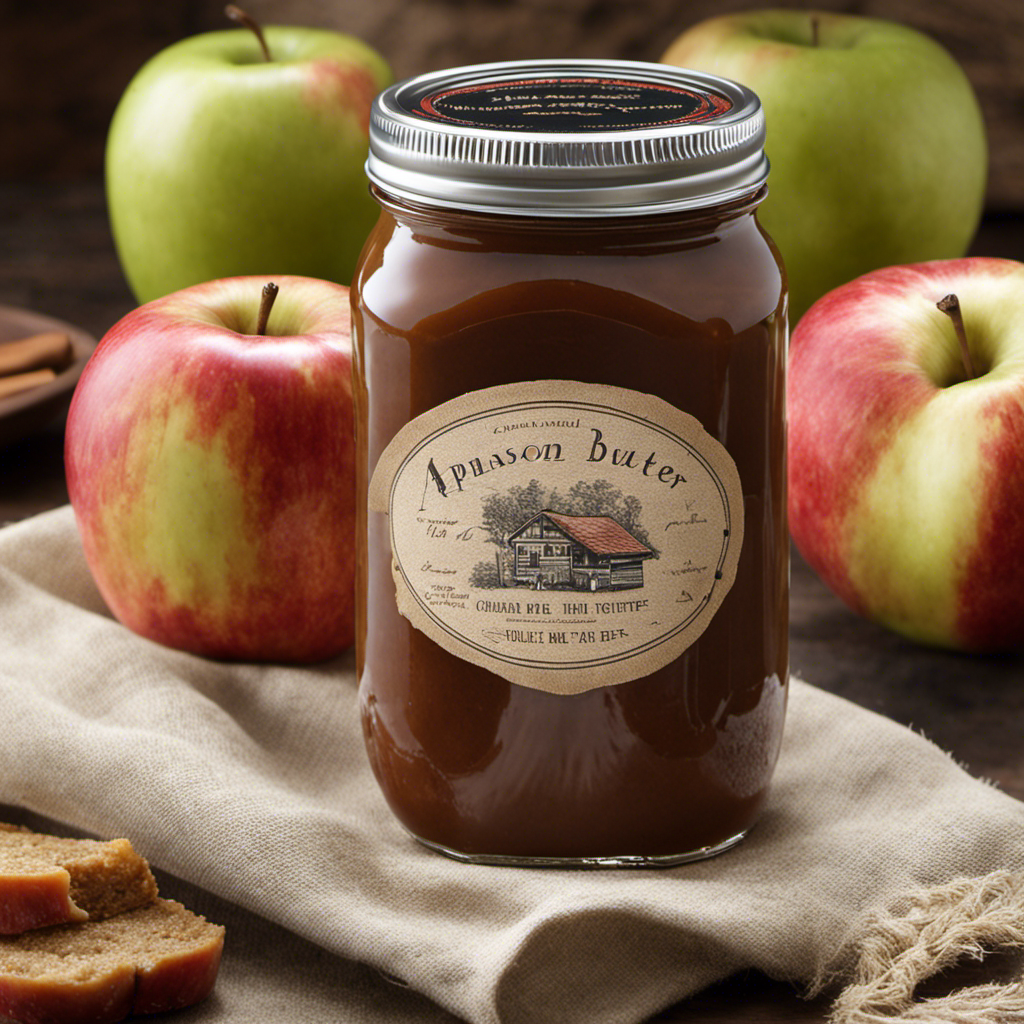I simply can’t say no to the rich and irresistible taste of truffle butter. Believe me, each bite is like a burst of flavor!
In this article, I’ll take you on a journey to discover the origins of truffle butter, the exquisite ingredients used to create it, and how it’s made.
Get ready to explore the culinary uses of this heavenly ingredient and pick up some handy tips for incorporating it into your own cooking.
Prepare to elevate your dishes to a whole new level of deliciousness with truffle butter.
Key Takeaways
- Truffle butter originated in France and gained popularity for adding exquisite flavor to dishes.
- Truffle butter combines the rich and creamy texture of butter with the earthy, umami flavors of truffles.
- Truffle butter offers health benefits as truffles contain antioxidants and have anti-inflammatory properties.
- Truffle butter can be used as a condiment or flavor enhancer in various dishes, such as pasta, risotto, grilled meats, and vegetables.
Origins of Truffle Butter
Truffle butter is believed to have originated in France, where it became popular for adding an exquisite flavor to various dishes. As a food lover, I can’t help but appreciate the rich and earthy taste that truffle butter brings to my meals.
However, if you can’t find truffle butter or simply want to try something different, there are a few substitutes you can consider.
One option is to use olive oil infused with truffle essence, which will still give you that distinctive flavor. Another substitute is to use a combination of butter and truffle oil. While it may not be as intense as truffle butter, it can still provide a similar taste.
In terms of health benefits, truffle butter can be a good source of healthy fats and is rich in antioxidants. However, it should be consumed in moderation due to its high calorie content.
Ingredients Used in Truffle Butter
One of the main ingredients used in making truffle butter is a high-quality unsalted butter. Truffle butter recipes often call for the use of this rich and creamy ingredient, which serves as the base for the luxurious spread. When combined with the earthy, umami flavors of truffles, it creates a delectable and indulgent treat.
As you melt the butter, the aroma of the truffles fills the air, creating a tantalizing sensory experience. The smooth texture of the butter allows it to glide effortlessly across your palate, leaving behind a lingering richness.
Indulging in truffle butter not only satisfies your taste buds but also offers some health benefits. Truffles are known to contain antioxidants and have anti-inflammatory properties, making truffle butter a delicious and nutritious addition to your culinary repertoire.
How Truffle Butter Is Made
To make truffle butter, you start by finely grating fresh truffles and then mixing them with softened, high-quality unsalted butter. This process allows the rich, earthy flavors of the truffles to infuse into the butter, creating a luxurious and versatile ingredient. Truffle butter is often used as a condiment or flavor enhancer in a variety of dishes, from pasta and risotto to grilled meats and vegetables. It adds a depth of flavor and aroma that is unmatched. However, if you’re looking for truffle butter alternatives, you can try using truffle oil or truffle salt to achieve a similar flavor profile. As for the health benefits of truffle butter, it is important to note that while truffles are a good source of antioxidants and essential vitamins, truffle butter should be consumed in moderation due to its high fat content. Remember, a little goes a long way when it comes to truffle butter!
| Truffle Butter Alternatives | Health Benefits of Truffle Butter |
|---|---|
| Truffle Oil | Good source of antioxidants and essential vitamins |
| Truffle Salt | High fat content – consume in moderation |
| Adds depth of flavor and aroma to dishes |
Culinary Uses of Truffle Butter
When using truffle butter in culinary applications, it’s important to remember that a little bit can go a long way in enhancing the flavors of your dishes. Truffle butter has a rich and earthy flavor profile that adds a luxurious touch to any meal.
Here are some ways you can pair truffle butter with different types of dishes:
- Spread a dollop of truffle butter on a warm slice of crusty bread and let the flavors melt in your mouth.
- Toss cooked pasta with truffle butter for a simple yet decadent pasta dish.
- Use truffle butter as a finishing touch for grilled steak or roasted vegetables.
- Melt truffle butter over popcorn for a gourmet movie night snack.
With its intense flavor, truffle butter can elevate a wide range of dishes.
Now, let’s move on to some tips for using truffle butter in cooking.
Tips for Using Truffle Butter in Cooking
Remember, it’s crucial to keep the temperature low when incorporating truffle butter into your cooking to prevent it from burning.
Truffle butter is a magical ingredient that can elevate any dish to new heights of flavor.
When it comes to pasta, adding a dollop of truffle butter to the sauce can take it from ordinary to extraordinary. The rich, earthy flavor of the truffles infuses the pasta, creating a decadent and luxurious experience for your taste buds.
But truffle butter isn’t limited to pasta alone. It can also be used as a finishing touch for roasted vegetables. Simply melt a small amount of truffle butter over the vegetables after they come out of the oven, and watch as the butter melts and coats each vegetable, enhancing their natural flavors and adding a touch of elegance to your dish.
Frequently Asked Questions
Can Truffle Butter Be Used as a Substitute for Regular Butter in Baking Recipes?
Yes, truffle butter can be used as a substitute for regular butter in baking recipes. It adds a luxurious, earthy flavor to your dishes that regular butter can’t match. Try it in pastries or bread for a unique twist.
Is Truffle Butter Suitable for Individuals With Lactose Intolerance or Dairy Allergies?
I can’t have dairy, but I found a lactose-free option that’s a game changer. Truffle butter is a luxurious alternative spread that adds a rich, earthy flavor to dishes. It’s perfect for anyone with lactose intolerance or dairy allergies.
How Long Does Truffle Butter Last Once Opened, and How Should It Be Stored?
Once opened, truffle butter can last for about 2-3 weeks if stored properly in the refrigerator. It’s important to tightly seal the container to prevent air exposure. Truffle butter can be incorporated into savory dishes such as pasta, risotto, or even spread on bread. There are different types of truffle butter available in the market, ranging from black truffle to white truffle, each offering a unique flavor profile.
Are There Any Health Benefits Associated With Consuming Truffle Butter?
There are some health benefits associated with consuming truffle butter. Compared to regular butter, truffle butter has a higher nutritional value, with added flavors and aromas that enhance culinary creations. It’s a versatile ingredient that can elevate any dish.
Can Truffle Butter Be Made at Home, or Is It Only Available for Purchase?
Making truffle butter at home is possible, although it requires fresh truffles and high-quality butter. If you don’t want to make it yourself, you can find truffle butter for purchase at gourmet food stores or online.
Conclusion
As I take my last bite of the rich and decadent truffle butter, I can’t help but wonder about its origins and the intricate process that brings this culinary delight to life.
The combination of earthy truffles and creamy butter creates a symphony of flavors that elevates any dish to new heights. Whether spread on warm bread or used to enhance the flavors of pasta and risotto, truffle butter is a true indulgence for the senses.
So next time you’re in the kitchen, don’t forget to add a dollop of this exquisite butter and let the magic unfold.








